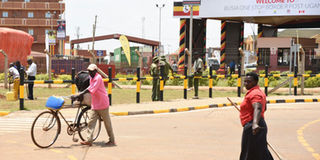EAC launches guide for cross-border traders in Busia

A boda boda operator ferries goods across the Busia one-stop border. EAC on May 2, 2018 launched a simple guide for cross border traders in bid to fill existing information gap that hinders, mostly women, from engaging in trade. PHOTO | ISAAC WALE | NATION MEDIA GROUP
What you need to know:
- EAC says guide was created to fill information gaps and numerous challenges faced by women that deny them opportunities to trade freely.
GIZ Cluster Coordinator, said the guides for small-scale women traders was an important initiative to bridge the gender income inequality gap.
The East African Community on Wednesday launched a simple guide for cross-border traders in Busia.
The guide, launched in partnership with the Kenyan government, is aimed at improving cross-border trade especially among women from the member states.
It provides information on existing policies, procedures, tariffs, exemptions and facilities available to cross-border traders.
Mr Samwel Mwangi, senior assistant director for regional integration, said the guide was created to fill information gaps and numerous challenges faced by women that deny them opportunities to trade freely.
“Most of them do not know the privileges they have and some of the laws that usually favour them. This has made them not thrive in the business,” said Mr Mwangi.
GAP
Mrs Florence Atieno, chairperson of Busia Women Cross-border Traders Association urged partners working at the border points to conduct several campaigns to inform the traders on the new guide.
She also asked for establishment of a central market and storage facilities at the Busia border.
Dr Kirsten Focken, GIZ Cluster Coordinator, said the guides for small-scale women traders are an important initiative to bridge the gender income inequality gap.
“We need to jointly investigate further where laws and regulatory environments facilitate or hinder gender equality and women’s economic participation and develop specific activities and interventions to remove the barriers,” said Dr Focken.
The GIZ coordinator pointed out that if women had the same access to productive resources as men, they could increase export and import income by 20 to 30 per cent and expand their business distribution channels across the region.





